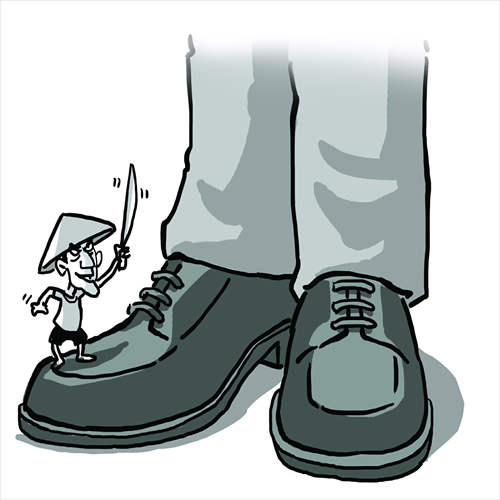Hanoi should give up on opportunism

Illustration: Liu Rui/GT
Vietnam has thousands of years of experience and lessons in dealing with China. When the two fall foul of each other, it is always Vietnam that eventually holds out an olive branch and makes peace with China.
Given the current circumstances, a stable Vietnam-China relationship is in line with the interests of Vietnam, because it doesn't want to detach itself from China's prosperous period of strategic opportunity.
We have to admit that Vietnam often takes the initiative in bilateral ties, and whether the relationship can go back on track depends on how much effort Vietnam will put.
Vietnam should abandon all delusions and cooperate with China to advance joint exploitation.
Hanoi denies China's nine-dash line, and its claims over the exclusive economic zones (EEZs) and continental shelves also forbid cooperation with China in these regions.
It intends to drive China out of the large expanse of seas south of the Xisha Islands.
If Vietnam doesn't change its attitude, both sides will engage in more clashes when China reinforces its efforts to defend its legitimate rights in this region.
It is impossible that the Vietnamese government will withdraw its original claims to the EEZs and continental shelves, but Vietnam should admit that these areas are in disputes. This will herald a win-win situation as both sides can seek common grounds to make joint development.
This requires Vietnam to reach an agreement domestically. As for China, this is also the only way that Beijing can avoid a conflict with Vietnam and in the meanwhile defend its own national interests.
Vietnam should also give up violence and go back to seeking a peaceful and reasonable resolution.
Hanoi has got used to playing tricks by resorting to violence and stoking up the sympathies of the global community. This has reduced the possibility of finding resolutions.
Such tricks worked in the past, because China had to compromise for the big picture. But when China is determined to defending its legitimate rights, Vietnam will find the tricks useless.
Vietnam must draw bitter lessons from the riots in May, which aggravated its domestic security environment. Vietnam is adept at changing strategies according to different scenarios. It should realize that a low-key diplomacy will serve it much better when dealing with disagreements with China.
Hanoi should be aware that its propaganda efforts in the past few years have backfired. The Vietnamese authorities have put unscrupulous efforts into propaganda demonizing and degrading China's image over the South China Sea issue. And this has aroused the mania of its whole population over the disputes.
China's image being distorted is the root cause why Vietnam's anti-China campaign has flared up. If such anti-China sentiment cannot be reversed, both Hanoi and Beijing will be confined in exploring possible paths to address the problems. In the end, Hanoi will be stranded by itself.
The Communist Party of Vietnam and the Vietnamese government must assume their responsibilities and show the Vietnamese people the true picture of Vietnam-China relations.
If they fail to properly guide the public opinion, it is impossible that they can manage well the bilateral relationship with China.
Hanoi must give up on opportunism and go back on track of the bilateral talks. History has proven that the benefits Vietnam can draw from a reciprocal and friendly relationship with China are far more important than the petty interests it can acquire by dragging an external force to interfere into the Vietnam-China relationship.
Both sides have successfully settled some of their historical issues, such as the demarcation of land boundary and the Beibu Gulf issue, which shows that a framework of bilateral talks will not force Vietnam to suffer losses.
So far, it seems that Vietnam still lacks the ability to draw wisdom from history. Hanoi keeps harboring a fantasy that it will prevail by pushing the South China Sea issue into international discourse.
Such efforts are defined by Beijing as unfriendly moves. Hanoi's aggressive actions on the sea, in a general situation where China is being contained by many external forces, will only meet China's countermeasures.
By playing tricks, Vietnam might get some sympathy or support from the international community. But its confrontation with China will only grow deeper. The sooner Vietnam realizes the consequences, the sooner both sides can turn over a new leaf.
The author is a research fellow of the Southeast Asian Studies Center of Guangxi Zhuang Autonomous Region. opinion@globaltimes.com.cn